
 |
||||||
|
GAY
FILM REVIEWS BY MICHAEL D. KLEMM
|
||||||
|
Milk Director: Screenplay: Starring: Rated R, 128 minutes |
Political
Theatre
While watching out director Gus Van Sant's terrific new film, Milk, I was struck with a sudden sense of deja vu during Harvey Milk's fight to defeat Proposition 6, the Briggs Initiative (which would have outlawed gay teachers in California public schools). History just repeated itself this year in the same state with Proposition 8 and we didn't have the Mayor of Castro Street to help us defeat it this time. I can't help wondering if it might have made a difference had Milk been released before the elections. Of that, we can only speculate and the point is moot anyway. Still, Milk is a film with the potential to influence popular opinion in much the same way that Victim (1961) helped to decriminalize homosexuality in Great Britain. |
|
In 1977, Milk was the first openly gay man to be elected to public office when, after three failed attempts, he successfully landed a seat on the San Francisco Board of Supervisors. Milk, along with Mayor Moscone, was assassinated by Dan White, a disgruntled former Supervisor, the following year. |
|
|
|
|
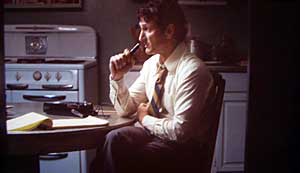 Van
Sant's Milk is a splendid tour
of the martyred statesman's life. We see nothing of his childhood and youth
but this is appropriate as his true "birth" would have to coincide with
his relocation from New York City to San Francisco's Castro Street. "I'm
40 years old and I haven't done a thing that I'm proud of," Milk tells his
new lover, Scott Smith (James Franco), as they sit in bed, eating birthday
cake. But that's about to change. His transformation begins when he abandons
a conservative Wall Street career to become a West Coast hippie. Van
Sant's Milk is a splendid tour
of the martyred statesman's life. We see nothing of his childhood and youth
but this is appropriate as his true "birth" would have to coincide with
his relocation from New York City to San Francisco's Castro Street. "I'm
40 years old and I haven't done a thing that I'm proud of," Milk tells his
new lover, Scott Smith (James Franco), as they sit in bed, eating birthday
cake. But that's about to change. His transformation begins when he abandons
a conservative Wall Street career to become a West Coast hippie. |
|
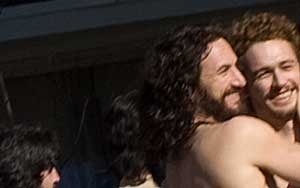 In
1972 he opened a camera shop on Castro Street and, despite the area's large
gay population, found prejudice in the neighborhood business association.
His first political act was to form an association of his own and to convince
his gay brothers to boycott any business perceived as being homophobic.
He speaks out against police harassment, he helps the local Teamsters with
their boycott of Coors beer in return for the Union hiring more gay drivers.
Milk united the area's diverse population and the residents began to call
him the Mayor of Castro Street. His shop became a magnet for the area's
activists. In
1972 he opened a camera shop on Castro Street and, despite the area's large
gay population, found prejudice in the neighborhood business association.
His first political act was to form an association of his own and to convince
his gay brothers to boycott any business perceived as being homophobic.
He speaks out against police harassment, he helps the local Teamsters with
their boycott of Coors beer in return for the Union hiring more gay drivers.
Milk united the area's diverse population and the residents began to call
him the Mayor of Castro Street. His shop became a magnet for the area's
activists. |
|
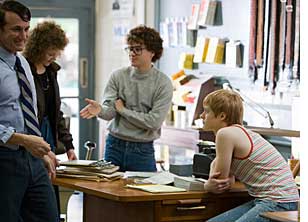 Milk
was a natural born speaker with a gift for inspiring and mobilizing his
listeners. He is a man who, by passing a pooper-scooper ordinance and making
sure it gets media coverage, wins the support of his straight constituents.
His finest hour may have been his role in defeating Senator Briggs' abominable
Proposition 6. He rebuts Briggs' assertion, during a debate, that homosexual
teachers are out to recruit their children by saying "If it were true that
children mimicked their teachers, you'd sure have a helluva lot more nuns
running around." Wit can be a razor-edged sword. Milk
was a natural born speaker with a gift for inspiring and mobilizing his
listeners. He is a man who, by passing a pooper-scooper ordinance and making
sure it gets media coverage, wins the support of his straight constituents.
His finest hour may have been his role in defeating Senator Briggs' abominable
Proposition 6. He rebuts Briggs' assertion, during a debate, that homosexual
teachers are out to recruit their children by saying "If it were true that
children mimicked their teachers, you'd sure have a helluva lot more nuns
running around." Wit can be a razor-edged sword. |
|
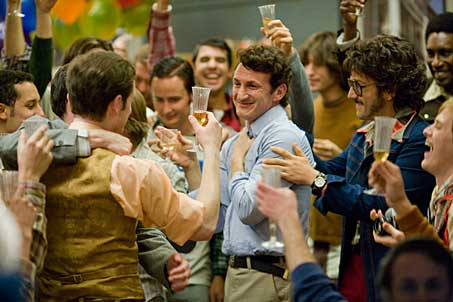 |
|
| Fitting Milk's remarkable life into two hours requires much condensing and consolidation, but out screenwriter Dustin Lance Black's script does a nice job in dramatizing the highlights of Milk's activism and balancing them with glimpses into his personal life. For Mr. Milk, politics is theatre and he transforms it into spectacle. His political drive will destroy two relationships and eventually cost him his life. Milk is presented as a man whose life isn't without contradictions. He excelled at recruiting new talent for his cause but it hardly seems accidental that all of them were cute as well. Scott calls Milk a hypocrite for imploring people to come out of the closet when he used to tell his family that his lover was a roommate. | |
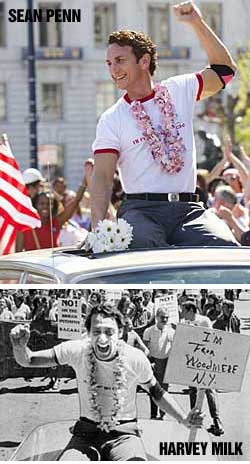 Sean
Penn, one of the cinema's uncanniest chameleons, delivers yet another remarkable
performance to his already impressive resume as he completely disappears
into his role as Harvey Milk. Just look at the genuine emotion and tears
of joy on Penn's face when Proposition 6 is defeated. Penn kisses several
men in the film, and lays in bed with at least one, and looks completely
credible and comfortable. That's the difference between some of today's
more gifted actors and the other ones who whine about hard it is to play
gay and how their agents told them not to take the part. He completes my
"Holy Trinity" of spectacularly gifted actors who each literally transformed
themselves into the historical figures that they portrayed, right down to
a physical resemblance; the other two being Gary Oldman's Joe Orton in Prick
Up Your Ears (1987) and Derek Jacobi's Francis Bacon in Love
Is the Devil (1998). Rather than raise him on a pedestal, or elevate
him to sainthood, Penn plays him as a flawed and ordinary man and aren't
most heroes usually just average people who get thrust into greatness? Sean
Penn, one of the cinema's uncanniest chameleons, delivers yet another remarkable
performance to his already impressive resume as he completely disappears
into his role as Harvey Milk. Just look at the genuine emotion and tears
of joy on Penn's face when Proposition 6 is defeated. Penn kisses several
men in the film, and lays in bed with at least one, and looks completely
credible and comfortable. That's the difference between some of today's
more gifted actors and the other ones who whine about hard it is to play
gay and how their agents told them not to take the part. He completes my
"Holy Trinity" of spectacularly gifted actors who each literally transformed
themselves into the historical figures that they portrayed, right down to
a physical resemblance; the other two being Gary Oldman's Joe Orton in Prick
Up Your Ears (1987) and Derek Jacobi's Francis Bacon in Love
Is the Devil (1998). Rather than raise him on a pedestal, or elevate
him to sainthood, Penn plays him as a flawed and ordinary man and aren't
most heroes usually just average people who get thrust into greatness? |
|
 The
acting by all is excellent. Special note should also be given to the performances
by the four most important men in Milk's story; James Franco as Scott Smith,
Emile Hirsch's exuberant Cleve Jones (he would conceive the NAMES Project
AIDS Memorial Quilt in the 80s), Diego Luna as his needy and unbalanced
lover, Jack Lira, (an underwritten part which may be one of the film's only
flaws) and finally Josh Brolin's chilling take on Milk's assassin, fellow
Supervisor Dan White. "I think he's one of us," Milk jokes to his pals and
he might not be too far off the mark. The
acting by all is excellent. Special note should also be given to the performances
by the four most important men in Milk's story; James Franco as Scott Smith,
Emile Hirsch's exuberant Cleve Jones (he would conceive the NAMES Project
AIDS Memorial Quilt in the 80s), Diego Luna as his needy and unbalanced
lover, Jack Lira, (an underwritten part which may be one of the film's only
flaws) and finally Josh Brolin's chilling take on Milk's assassin, fellow
Supervisor Dan White. "I think he's one of us," Milk jokes to his pals and
he might not be too far off the mark. |
|
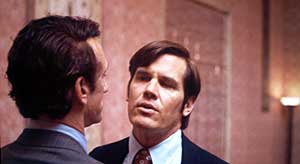 White
is the all- American, alcoholic, football hero and Milk's polar opposite.
He is cautiously friendly to Milk, despite their differences. He seems both
attracted and repulsed by Milk's homosexuality, and often references the
Bible, yet he often seeks his help. Milk is the only supervisor who attends
White's son's Baptism. They are uneasy compatriots until Milk votes against
one of White's pet causes. White, who campaigned on a pro-family/patriotic
platform, becomes the only Supervisor to vote against Milk's gay anti-discriminatory
bill. This has long been a matter of debate but Van Sant adds a few subtle
visual clues to suggest that White was deep in his own closet. During a
drunken tirade, White all but comes out to Milk in one of the film's most
striking scenes. White
is the all- American, alcoholic, football hero and Milk's polar opposite.
He is cautiously friendly to Milk, despite their differences. He seems both
attracted and repulsed by Milk's homosexuality, and often references the
Bible, yet he often seeks his help. Milk is the only supervisor who attends
White's son's Baptism. They are uneasy compatriots until Milk votes against
one of White's pet causes. White, who campaigned on a pro-family/patriotic
platform, becomes the only Supervisor to vote against Milk's gay anti-discriminatory
bill. This has long been a matter of debate but Van Sant adds a few subtle
visual clues to suggest that White was deep in his own closet. During a
drunken tirade, White all but comes out to Milk in one of the film's most
striking scenes. |
|
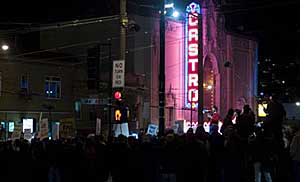 Van
Sant's film is a labor of love and he does an exquisite job of combining
archival footage with a beautifully recreated 1970s Castro Street. The cars,
the clothes, the haircuts... this is Van Sant doing a Period Piece that
still looks like, and retains the unique flair of, Mala
Noche and My Own
Private Idaho. His attention to detail is meticulous. The re-staging
of the candlelight march on the night of Milk's memorial, mingled with actual
aerial film of the miles-long march, should send chills down the viewer's
spine, not to mention a lump in the throat. Younger readers know fully well
who Jerry Fallwell, Pat Robertson and the Rev. Fred Phelps are, but there
is another name from the 70s that members of my generation still hold in
even higher contempt and that is Anita Bryant. Her "Save Our Children" campaign,
which repealed a gay rights law in Florida, will forever insure her position
as one of the most hated, homophobic ringleaders of all time. Van Sant includes
television footage of the sanctimonious singer spouting some of the same
hate rhetoric that we hear today and we realize, sadly, that some things
still haven't changed. Van
Sant's film is a labor of love and he does an exquisite job of combining
archival footage with a beautifully recreated 1970s Castro Street. The cars,
the clothes, the haircuts... this is Van Sant doing a Period Piece that
still looks like, and retains the unique flair of, Mala
Noche and My Own
Private Idaho. His attention to detail is meticulous. The re-staging
of the candlelight march on the night of Milk's memorial, mingled with actual
aerial film of the miles-long march, should send chills down the viewer's
spine, not to mention a lump in the throat. Younger readers know fully well
who Jerry Fallwell, Pat Robertson and the Rev. Fred Phelps are, but there
is another name from the 70s that members of my generation still hold in
even higher contempt and that is Anita Bryant. Her "Save Our Children" campaign,
which repealed a gay rights law in Florida, will forever insure her position
as one of the most hated, homophobic ringleaders of all time. Van Sant includes
television footage of the sanctimonious singer spouting some of the same
hate rhetoric that we hear today and we realize, sadly, that some things
still haven't changed. |
|
|
|
|
| Reviewer's revision 2009: Milk has just been released on DVD. It's been over three months since I attended a press screening - a week before the film opened in Buffalo - and I have to say that the film not only holds up on a subsequent viewing but it was even better the second time. I'd like to add a few new thoughts. | |
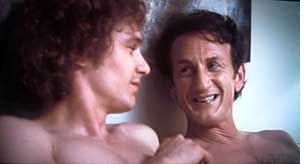 Milk
received a surprising amount of positive press from the mainstream and most
of the negative reviews that I encountered have come from certain quarters
within the gay community. I feel that I have to answer the critics who complained
that there wasn't enough sex in the film; another website that specializes
in gay film reviews called Milk
"homogenized" and said the film had "no balls." What do these people want?
Sean Penn repeatedly kissed other men throughout the film and he is seen
in bed with at least two of his lovers. Granted the one scene is a bit dark
but we can still see what is going on. The same review site that I mentioned
above also complained that a scene of Milk going to the baths was reportedly
cut. (If such a scene was filmed, it's not in the deleted scenes
section on the DVD.) It made sense to include a scene where Joe Orton
trawls public lavatories in Stephen Frears' 1987 Prick
Up Your Ears because the famous playwright's notorious promiscuity
was one of the factors that led to his unbalanced and jealous lover, Kenneth
Halliwell, bashing his head in with a hammer. But what purpose would such
a scene have served here? The historical Milk was known to have
been a bit of a slut but enough of this aspect to his personality is hinted
at throughout the film. Milk
received a surprising amount of positive press from the mainstream and most
of the negative reviews that I encountered have come from certain quarters
within the gay community. I feel that I have to answer the critics who complained
that there wasn't enough sex in the film; another website that specializes
in gay film reviews called Milk
"homogenized" and said the film had "no balls." What do these people want?
Sean Penn repeatedly kissed other men throughout the film and he is seen
in bed with at least two of his lovers. Granted the one scene is a bit dark
but we can still see what is going on. The same review site that I mentioned
above also complained that a scene of Milk going to the baths was reportedly
cut. (If such a scene was filmed, it's not in the deleted scenes
section on the DVD.) It made sense to include a scene where Joe Orton
trawls public lavatories in Stephen Frears' 1987 Prick
Up Your Ears because the famous playwright's notorious promiscuity
was one of the factors that led to his unbalanced and jealous lover, Kenneth
Halliwell, bashing his head in with a hammer. But what purpose would such
a scene have served here? The historical Milk was known to have
been a bit of a slut but enough of this aspect to his personality is hinted
at throughout the film. |
|
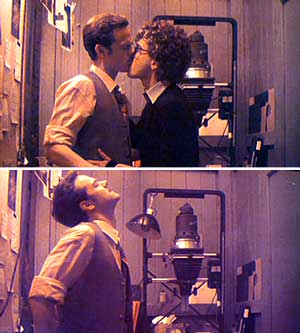 For
a film that totally wimped out on showing gay sexuality, look at 1993's
Philadelphia. The one kiss
in that movie is filmed from behind and all we see is the back of
Tom Hanks' head. Hanks and Antonio Banderas are never shown in bed together,
though there is one romantic scene where they dance at a costume party.
Milk did not go that
route. And as for it having no balls, how about the quick flash of Cleve
Jones obviously going down on another campaign worker when Milk wins the
election, or the staff member who pays the cute pizza delivery boy by shoving
the money down the crotch of his pants? (This was after Harvey asks "Is
anybody going to pay the pizza guy or are we all just going to stare at
him?") Nobody is de-sexed in Van Sant's Milk.
As for portraying Harvey Milk as a saint, how about his lover who hangs
himself? For
a film that totally wimped out on showing gay sexuality, look at 1993's
Philadelphia. The one kiss
in that movie is filmed from behind and all we see is the back of
Tom Hanks' head. Hanks and Antonio Banderas are never shown in bed together,
though there is one romantic scene where they dance at a costume party.
Milk did not go that
route. And as for it having no balls, how about the quick flash of Cleve
Jones obviously going down on another campaign worker when Milk wins the
election, or the staff member who pays the cute pizza delivery boy by shoving
the money down the crotch of his pants? (This was after Harvey asks "Is
anybody going to pay the pizza guy or are we all just going to stare at
him?") Nobody is de-sexed in Van Sant's Milk.
As for portraying Harvey Milk as a saint, how about his lover who hangs
himself? |
|
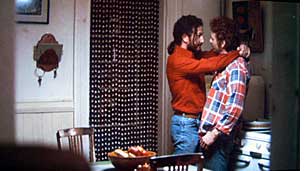 Another
criticism was that none of Milk's life prior to going to San Francisco was
depicted, and that we didn't see Dan White's trial with its infamous "twinkie
defense" or the riot that followed his hand-slap of a sentence. Maybe Van
Sant could have included these elements but it would have added
at least another half hour to the film's running length. Milk
is not a propaganda film and some thought should be taken towards
not losing the straight people in the audience by making the movie longer
than it needed to be. The abomination of White's light sentence is addressed,
albeit briefly, in the ending title cards. Another
criticism was that none of Milk's life prior to going to San Francisco was
depicted, and that we didn't see Dan White's trial with its infamous "twinkie
defense" or the riot that followed his hand-slap of a sentence. Maybe Van
Sant could have included these elements but it would have added
at least another half hour to the film's running length. Milk
is not a propaganda film and some thought should be taken towards
not losing the straight people in the audience by making the movie longer
than it needed to be. The abomination of White's light sentence is addressed,
albeit briefly, in the ending title cards. |
|
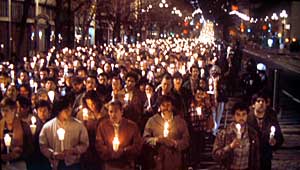 Duncan
Lance Black's Oscar-winning script masterfully encompasses the highlights
of Milk's remarkable activism and balances it with glimpses into
his private life. Contrasting the success of his grass roots organizing
with the failures of his personal relationships was a masterstroke of storytelling.
And Van Sant's filmic methods were at times more unconventional than I first
remembered them to be; Milk is
a nice mix of his mainstream efforts and the more underground styles that
he has indulged with in the past. I also have to reiterate once again that
Sean Penn is just amazing as Harvey Milk and his Oscar for best
actor was truly deserved. For those who think the film might be lacking
in some respects, please consider the profound effect that Milk
will have on some lonely teen in a podunk town. These kids need a role model
and Milk is just the ticket. Duncan
Lance Black's Oscar-winning script masterfully encompasses the highlights
of Milk's remarkable activism and balances it with glimpses into
his private life. Contrasting the success of his grass roots organizing
with the failures of his personal relationships was a masterstroke of storytelling.
And Van Sant's filmic methods were at times more unconventional than I first
remembered them to be; Milk is
a nice mix of his mainstream efforts and the more underground styles that
he has indulged with in the past. I also have to reiterate once again that
Sean Penn is just amazing as Harvey Milk and his Oscar for best
actor was truly deserved. For those who think the film might be lacking
in some respects, please consider the profound effect that Milk
will have on some lonely teen in a podunk town. These kids need a role model
and Milk is just the ticket. |
|
|
Milk will probably never satisfy everyone but this picky reviewer finds it to be an admirable film that, like Brokeback Mountain, managed to be a crossover hit that appealed to both gay and straight audiences alike. What more can we ask for, especially in these troubling times? If you haven't noticed, the right wing fringe is mobilizing against us again. A note on the DVD: There could have been a few more extras but there is a nice, though short, documentary entitled "Remembering Harvey" and it features many of the real principals involved in Milk's story. If you want more, I highly recommend buying or renting Rob Epstein's Oscar-winning 1984 documentary, The Times Of Harvey Milk.
|
|
|
A personal remembrance: More On Gus van
Sant: More On Dustin
Lance Black: Emile Hirsch also
appears in: James Franco also
appears in: Stephen Spinella
also appears in: Denis O'Hare also
appears in: Brent Corrigan also appears in:
|